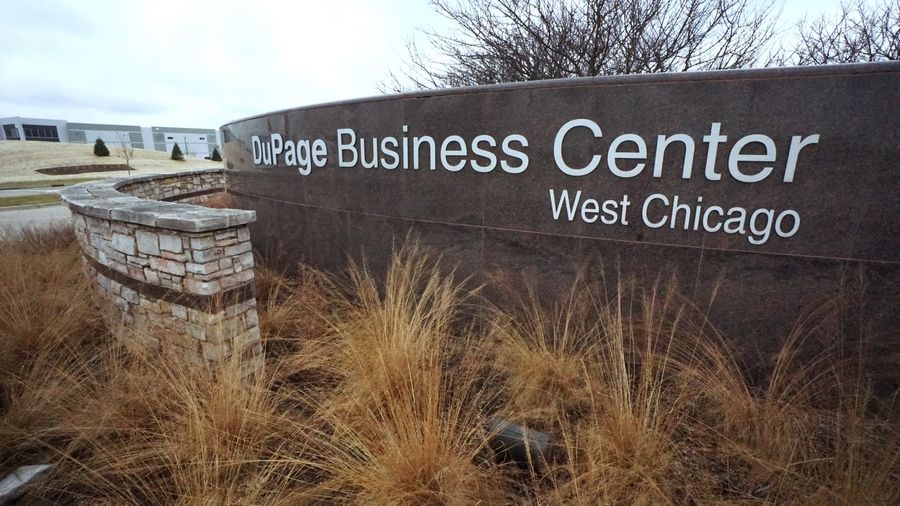January 2023
NAI Hiffman and DuPage Airport Authority Implement a Winning Strategy in West Chicago

By Orrin Schwarz
This is a turnaround story. Credit a change in business model.
For years the technology park south of DuPage Airport in West Chicago languished, unable to lure more than a few businesses. About four years ago the DuPage Airport Authority decided to try a different way at DuPage Business Center.
No longer would it focus on leasing property to tech companies. The airport authority turned to Oakbrook Terrace-based commercial real estate firm NAI Hiffman to try selling plots of land for other commercial uses.
The result is, instead of weeds growing at DuPage Business Center, the center is growing like a weed.
“It’s gone extremely well,” DuPage Airport Authority Executive Director Mark Doles said, “and well-received by the development community, with over 350 acres developed so far and almost 5 million square feet of buildings constructed in the last three to five years.”
What used to be a three-building park now sports 15 buildings, with another 100 acres under contract for possible sale in 2023, according to John Whitehead, executive vice president at NAI Hiffman. NAI Hiffman has seen just over 4.1 million square feet of development since it got involved in 2018, with another 925,000 square feet of planned speculative development for that land under contract. NAI Hiffman has sold 285 acres — not including the land still under contract — to businesses that were looking to build for themselves or developers out to develop the buildings and find an occupant later.
“It’s been a whirlwind, frankly,” Whitehead said. “If I would’ve told you five or 10 years ago, if you were a developer and I told you to buy all the land in West Chicago, it’s going to be the moneymaker, you would have questioned my rationale as a broker. It’s funny how crazy and how this area of the world has just lit on fire.”
Why the change worked
Location would seem to work against DuPage Business Center. It’s not that close to an interstate, and it doesn’t have easy access to O’Hare Airport. Yet still it is thriving because it found use in warehousing and manufacturing.
It’s a sign of the growth in the Chicago market. You go where the land is, and until recently the land owned by the DuPage Airport Authority was among the little bit still available in the suburbs.
There’s little land left available in Naperville, about 6 miles to the south, and there’s little land left in central DuPage, towns like Glendale Heights and Carol Stream, Whitehead and his colleague Mark Moran said. It was only natural to look toward this spot.
“Companies are not nearly as sensitive to (location) as they used to be,” said Moran, also a NAI Hiffman executive vice president. “I tell people the Fox Valley and I-88 have kind of merged into one big submarket now. So we get very little pushback on location anymore.”
For Amazon, the location was a plus because it’s near the homes it delivers to out of the warehouse it has at DBC. It has 40 acres that includes a 125,000-square-foot building that leaves room for a parking lot for its fleet of delivery trucks.
The rest of the companies operating at DBC are smaller, some much smaller. They include some food manufacturers, plus Norix, a St. Charles-based injection-molded furniture company.
There are just three or four small properties still available — a 10-acre site, two 6-acre sites and one 5-acre site — but because they are odd-shaped plots, it will be harder to find someone willing to make use of them. But once those plots are gone, Moran and Whitehead will have to move on to other things.
“Unfortunately, Mark and I are kind of putting ourselves out of business,” Whitehead joked.
“I wish we had another 300 or 400 acres because the demand is still there,” Moran added.
In fact the success of DBC has improved the prospects of other properties in the area because developers have proof “there’s a story to tell there now,” Moran said.
What it means for taxpayers
The airport authority couldn’t be happier. It’s goal of a long-term stream of revenue from DuPage Business Center clearly wasn’t working out.
Instead it has seen an influx of cash that it is putting to work for the long term. It is investing capital from the DBC into other revenue-producing investments at the airport, such as new hangar capacity that will allow it to increase the number of planes at the airport and raise fuel sales.
“It’s been a boon not only to the airport but to the entire region when we look at that massive impact that comes off of this facility,” Doles said. “And that impacts everyone around DuPage Airport, including all of DuPage County with regards to businesses deciding to develop and have their headquarters here.”
A state report suggests DuPage Airport has $1.5 billion of economic impact on Illinois, particularly in the suburbs. The survey projects $66.5 million in visitor spending and 5,524 jobs brought in. The airport authority hopes to use revenue from DuPage Business Center to build on those numbers.
The sale of that land to private entities also has affected the local property tax base. It went from farmland taxed at a low rate to developed property that adds to local government revenues in a much more substantial way, Doles said.
These properties now have equalized assessed valuations of about $4 million to $12.5 million, “Which contributes a significant amount of property tax dollars to the various governmental units,” said Michael Guttman, West Chicago city administrator, adding, “It certainly helps our school districts tremendously.”
Adding large corporate entities to West Chicago also raises the city’s profile as a business hug, Guttman said.
Moran credited the West Chicago governmental units for being willing to do tax abatements to help lure developers to the property.
“West Chicago being as cooperative as they were was definitely a big help for us as well,” he said.
Guttman said six units of government banded together to create an economic development incentive in which for up to 10 years at a maximum of $4 million per property, they will abate up to 50% of the property tax bill. Those governmental units will receive more money for 10 years, even at a 50% discount, than they would have. Starting in the 11th year they get the full value.
“It’s a happy to conclusion to the park,” Whitehead added.

